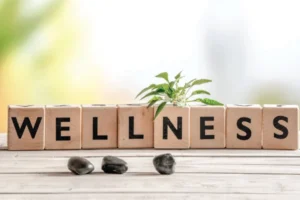Stress is a common part of everyday life these days, and people often feel overwhelmed by work, responsibilities, and personal problems. While some stress is normal, chronic, excessive stress can negatively impact both physical and mental health. The favorable news is that you don’t have to make drastic changes to improve your life. Simple daily actions can help. Health isn’t just about physical well-being; it’s also about finding balance, relaxation, and inner peace. Even if you’re busy, simple daily actions can reduce stress levels and improve overall well-being.
How a Balanced Diet Can Help You Manage Stress
The food we eat significantly impacts how we feel and how our bodies respond to stress. Eating a balanced diet full of whole foods like fruits, vegetables, lean proteins, and whole grains can help maintain healthy energy levels and help you feel better. Avoiding excessive caffeine, processed foods, and sugary snacks can help reduce anxiety and maintain stable energy levels, which can alleviate stress. Cooking at home every day, drinking enough water, and eating mindfully can all help you feel calmer. A healthy diet helps you stay alert and focused, which helps you manage stress better.
Exercise is a Natural Way to Relieve Stress
One of the best ways to relieve stress and improve your mood is through exercise. You don’t have to exercise vigorously every day; walking, stretching, or light exercises are all you need. Exercise releases endorphins, also known as “feel-good hormones.” These hormones naturally improve your well-being and reduce stress. Taking just a few minutes to do something can help you clear your head and recharge. Daily activity is beneficial for your health and helps you manage stress in the long run.
Sleep is Essential for Stress Management
Sleep is one of the most important, yet often overlooked, components of optimal health. It is crucial for stress management. Insufficient sleep can make you more irritable, less focused, and harder to manage. Seven to eight hours of sleep a night gives your body and mind the chance to recover. Simple things like going to bed at the same time every night, avoiding screens late at night, and creating a calm sleep environment can help you sleep better. A good night’s sleep reduces stress and improves overall health.
The Importance of Mindfulness in Daily Life
Mindfulness is a powerful stress-reducing technique that increases your awareness of the present moment, helping you stay calm and focused on it instead of stressing about the past or future. Deep breathing, a short meditation, or mindful eating are all ways to easily relax. Daily mindfulness can help you process emotions, stay focused, and reduce anxiety. Practicing mindfulness regularly can make you stronger and help you stay calm, even when things get tough.
Staying Hydrated
It may seem simple, but drinking enough water is a surprisingly effective way to relieve stress. Dehydration can lead to fatigue, headaches, and mood swings, all of which can exacerbate stress. Drinking enough water throughout the day can help you stay alert, maintain your energy, and reduce the stress on your body. Carrying a water bottle, drinking water before meals, and replacing sugary drinks with water or herbal tea are all simple ways to stay hydrated. This simple yet effective habit can help you stay healthy and make managing daily stress easier.
Incorporate Relaxation into Your Busy Schedule
Taking short breaks each day is crucial to reduce stress and maintain balance in your life. You don’t have to rest for a long time to relax; even a few minutes can help. Listening to soothing music, spending time in nature, or doing breathing exercises are all simple ways to feel better. Taking short breaks to relax throughout the day can prevent stress from building up. Over time, practicing these daily habits can help you live a better and more peaceful life.
Avoiding Habits That Increase Stress
Staying healthy every day requires developing positive habits and avoiding habits that increase stress. Excessive caffeine consumption, alcohol consumption, smoking, or prolonged screen time can all contribute to stress. Replacing these habits with healthier ones, such as drinking water, walking, or reading, can have a significant impact on your overall health. By recognizing unhealthy tendencies, you can take responsibility and make decisions that contribute to your long-term health. Reducing negative behaviors is an important step toward reducing stress and finding balance in your life.
Conclusion
Stress is a normal part of life, but doing healthy things every day can help reduce it and lead to a healthier life. Eating well, getting enough sleep, staying hydrated, and relaxing can help you manage stress better. Building strong social relationships, avoiding negative habits, and taking excellent care of yourself can all contribute to your long-term health. These small, daily decisions can help you maintain consistency and balance, making it easier to handle situations calmly and confidently. Stress reduction doesn’t require complex solutions; it requires simple, conscious actions every day.
FAQs
1. What are the best daily activities to relieve stress?
The best ways to relieve stress are simple things like deep breathing, regular exercise, getting enough sleep, and drinking plenty of water.
2. How does sleep affect stress?
Sleep helps your body and mind recover. Lack of sleep can make you more irritable and unable to cope with stress.
3. Can a healthy diet help you reduce stress?
Yes, a balanced, healthy diet can improve your mood and energy levels, and avoiding excessive caffeine and sweets can help relieve anxiety.
4. Should I meditate daily to reduce stress?
Even a few minutes of mindfulness or meditation each day can help reduce stress.
5. Do you need exercise to relieve stress?
Yes, exercise releases endorphins, which make you feel better, and it’s a natural way to reduce stress.




